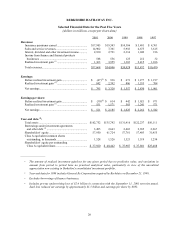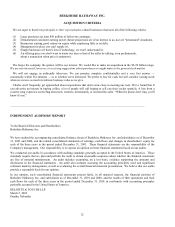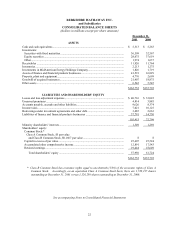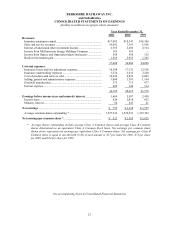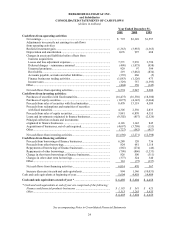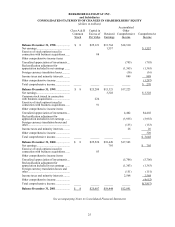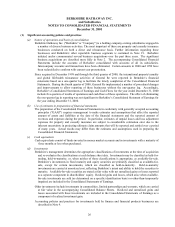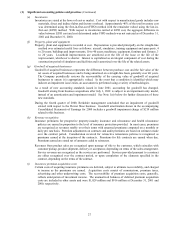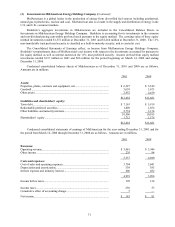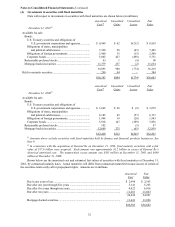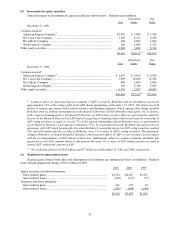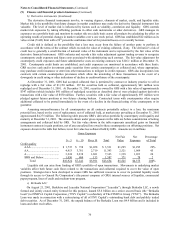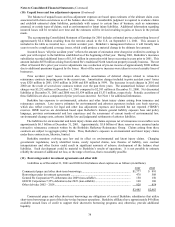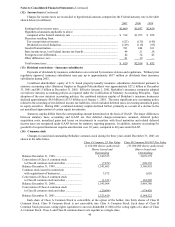Berkshire Hathaway 2001 Annual Report Download - page 31
Download and view the complete annual report
Please find page 31 of the 2001 Berkshire Hathaway annual report below. You can navigate through the pages in the report by either clicking on the pages listed below, or by using the keyword search tool below to find specific information within the annual report.
30
Notes to Consolidated Financial Statements (Continued)
(2) Significant business acquisitions (Continued)
Justin Industries, Inc. (“Justin”)
Effective August 1, 2000, Berkshire acquired Justin. Principal businesses of Justin include: Acme Building
Brands, a leading manufacturer and producer of face brick, concrete masonry products and ceramic and marble floor
and wall tile and Justin Brands, a leading manufacturer of Western footwear under a number of brand names.
U.S. Investment Corporation (“USIC”)
Effective August 8, 2000, Berkshire acquired USIC. USIC is the parent of the United States Liability Insurance
Group, one of the premier U.S. writers of specialty insurance.
Benjamin Moore & Co. (“Benjamin Moore”)
Effective December 18, 2000, Berkshire acquired Benjamin Moore. Benjamin Moore is a formulator,
manufacturer and retailer of a broad range of architectural and industrial coatings, available principally in the U.S. and
Canada.
Aggregate consideration paid for the five business acquisitions consummated in 2000 totaled $2,370 million,
consisting of $2,146 million in cash and the remainder in Berkshire Class A and Class B common stock.
Each of the business acquisitions described above was accounted for under the purchase method. The excess of the
purchase cost of the business over the fair value of net assets acquired was recorded as goodwill of acquired businesses.
The results of operations for each of the nine entities acquired in 2001 and 2000 are included in Berkshire’ s
consolidated results of operations from the effective date of each merger. The following table sets forth certain
unaudited consolidated earnings data for 2001 and 2000, as if each of the acquisitions discussed above were
consummated on the same terms at the beginning of each year. Dollars are in millions except per share amounts.
2001 2000
Total revenues ............................................................................................................................ $38,137 $41,724
Net earnings ............................................................................................................................... 803 3,420
Earnings per equivalent Class A Common Share...................................................................... 526 2,243
During the second half of 2001 Berkshire initiated two additional business acquisitions which had not closed as of
December 31, 2001. Information concerning these transactions follows.
Albecca Inc. (“Albecca”)
Effective February 8, 2002, Berkshire acquired for cash all of the outstanding shares of Albecca. Albecca designs,
manufactures and distributes a complete line of high-quality custom picture framing products primarily under the
Larson-Juhl name.
Fruit of the Loom (“FOL”)
On November 1, 2001, Berkshire announced that it had entered into an agreement with Fruit of the Loom, LTD.
and Fruit of the Loom, Inc. (together the “FOL entities”) to acquire the FOL entities’ basic apparel business. Under
terms of the agreement, the purchase price of $835 million in cash is subject to significant reduction for certain
liabilities, as well as adjustment upward or downward depending on working capital levels.
The FOL entities are currently operating as debtors-in-possession pursuant to its Chapter 11 bankruptcy filing
currently pending before the United States Bankruptcy Court for the District of Delaware (the “Bankruptcy Court”). On
January 2, 2002, the Bankruptcy Court issued an order determining Berkshire as the successful bidder for the FOL
entities’ basic apparel business. A hearing to determine whether the FOL reorganization plan is confirmed (such plan
contemplates the aforementioned sale of the basic apparel business to Berkshire) has been scheduled for April 4, 2002.
If the FOL reorganization plan is confirmed at that time, the closing will occur in the second quarter of 2002.
The FOL apparel business is a leading vertically integrated basic apparel company manufacturing and marketing
underwear, activewear, casualwear and childrenswear. The FOL apparel business operates on a worldwide basis and
sells its products principally in North America under the Fruit of the Loom and BVD brand names.
(3) Investments in MidAmerican Energy Holdings Company
On March 14, 2000, Berkshire invested approximately $1.24 billion in common stock and a non-dividend paying
convertible preferred stock of MidAmerican Energy Holdings Company (“MidAmerican”). Such investment gave
Berkshire about a 9.7% voting interest and a 76% economic interest in MidAmerican on a fully-diluted basis. Berkshire
subsidiaries also acquired approximately $455 million of an 11% non-transferable trust preferred security. Mr. Walter
Scott, Jr., a member of Berkshire’ s Board of Directors, controls approximately 86% of the voting interest in
MidAmerican.


